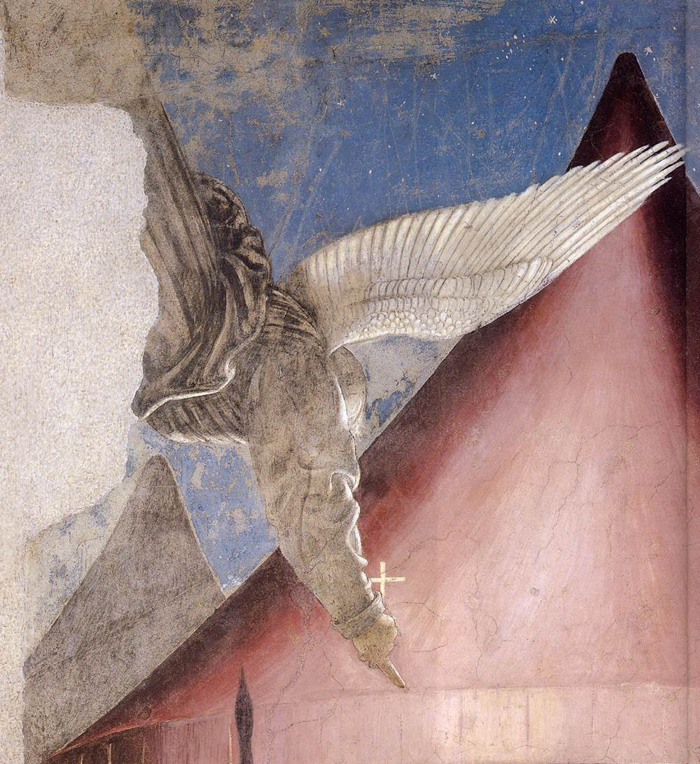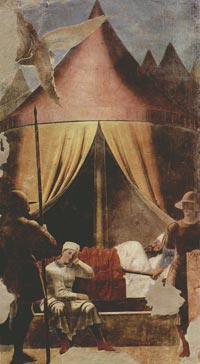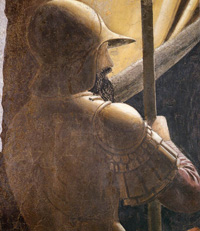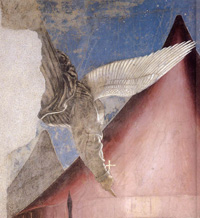| |
|
| |
|
|
|
|
|
|
| |
 |
 |
Piero della Francesca, Vision of Constantine (detail), 1452-66, fresco, San Francesco, Arezzo [1]
|
|
 |
|
| |
|
|
|
| |
|
Piero della Francesca | Storie della Vera Croce, il Sogno di Costantino | The Vision of Constantine
|
|
|
|
| |
|
Piero unified, completed, and refined upon the discoveries artists like Masaccio, Donatello, Domenico Veneziano, Filippo Lippi, Uccello, and even Masolino had made in the previous 20 years and created a style in which monumental, meditative grandeur and almost mathematical lucidity are combined with limpid beauty of colour and light. His major work is a series of frescos on the Legend of the True Cross in the choir of San Francesco at Arezzo (c. l452-c. l465). The subject was a medieval legend of great complexity, but Piero made from its fanciful details some of the most solemn and serene images in western art.
The Dream of Constantine depicts the night before the battle at the Milvern Bridge between Constantine’s forces and those of Maxentius. This battle would prove to be the turning point in the conflict and would lead to Constantine coming to power in 312 and Christianity being established throughout the Roman Empire. That night it was claimed that Constantine had a dream about a cross in the sky which was accompanied by the message – 'In hoc signo vinces', which means 'By this sign you shall conquer'. He then went on to use the symbol in place of the traditional Roman eagle as the symbol for his legions in the battle [2].
|

|
Piero della Francesca, Vision of Constantine (detail), 1452-66, fresco, San Francesco, Arezzo
|
The recent restoration of the frescoes by Piero della Francesca in the Church of San Francesco in Arezzo has made to appear on the background of the scene of Constantine's dream a number of stars. They are clearly painted with the intention to illustrate a sort of "natural" sky. In 2001 Anna Maria Maetzke recognized in a group of stars the constellation of the Ursa Minor, but so far no further study has been carried on to find any relation between the painted and the true sky. In this paper I show the existence of more constellations in the fresco, which are hardly detectable due to the mirror representation of the starry sky. Such a mirror image, as the Universe was seen from the outside, has a Greek origin and this kind of representation was introduced in Western Europe not only in celestial globes but also in star maps. This discovery leads to consider that Piero had at his disposal either a globe or a map which he reproduced on the fresco.
Vladimiro Valerio suggests that a star map might be supplied to Piero by the astronomer Regiomontanus who was in Italy since 1461 following the Cardinal Bessarion in his journey from Vienna to Rome. In 1463, Cardinal Bessarion was named papal legate to Venice and in July of the same year he leaved Rome together with Regiomontanus to reach Ferrara and Venice. The road to Venice crossed Umbria nearby Sansepolcro, Piero's birthplace not far from Arezzo. The trip took more than two weeks due to a stop before crossing the Apennines because the plague in Ferrara. Bessarion and Regiomontanus might have met Piero who was painting the cycle of frescoes in Arezzo and supplied him with a star map.
Unfortunately, due to the lack of the horizon and any right line in the scene it is not possible to detect the latitude of the place corresponding to the painted sky [3].
|
|
|
|
| |
|
|
|
| |
|
| |

[1] Quest'opera è nel pubblico dominio. Fonte: Web Gallery of Art
[2] The Dream of Constantine | www.pierodellafrancesca.org/dream-of-constantine
[3] See also Valerio, V., Piero della Francesca's Sky in The Dream of Constantine, in The Inspiration of Astronomical Phenomena VI. Proceedings of a conference held October 18-23, 2009 in Venezia, Italy. Edited by Enrico Maria Corsini. ASP Conference Series, Vol. 441. San Francisco: Astronomical Society of the Pacific, 2011, p.161 (Source: http://adsabs.harvard.edu/abs/2011ASPC..441..161V)
Bibliografie
Birgit Laskowski, Piero della Francesca, collana Maestri dell'arte italiana, Gribaudo, Milano 2007.
Fabrizio Falconi, La visione di Costantino e L’Arco di Malborghetto sulla Via Flaminia.
Eugenio Battisti, Marisa Dalai Emiliani, Piero della Francesca. Opera completa, Mondadori Electa, 1993
|

Art in Tuscany | Constantine's Dream
Arte in Toscana | Piero della Francesca | Storie della Vera Croce, il Sogno di Costantino
Het sterrenbeeld Cygnus – Zwaan | www.kuuke.nl/alle-sterrenbeelden/cygnus-zwaan
Art in Ttscany | Storie della Vera Croce
Arte in Toscana | Storie della Vera Croce, 1452-1466, affreschi, Basilica di San Francesco, Arezzo
Art in Tuscany | The Golden Legend (Legenda aurea or Legenda sanctorum)
|
|
|
| |
|
|
|
| |
|
|
|
| |
|
|
|
| |
|
|
|
| |
|
|
|
| |
|
|
|
![]()







